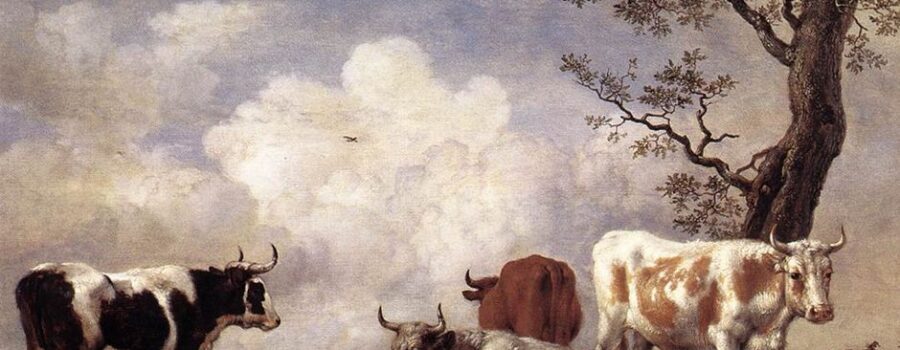Trevor Laurence
In Leviticus 11:1–3, the Lord identifies the characteristics of ritually clean land animals that the Israelites may eat. Among these features, the Lord specifies that such animals must “chew the cud.” To say that this stipulation is puzzling to modern readers would be an understatement. What is going on here?
In her book Leviticus as Literature, Mary Douglas observes that the Hebrew word here typically translated “chew” literally means “to bring up.”1 Israel is only permitted to eat land animals whose food goes down a first time and is brought up to be chewed again—they “bring up the cud.” Douglas points out that this term from the beginning of Leviticus 11 also appears at the end in verse 45 when God declares that he is the Lord “who brought you up out of the land of Egypt.”
Israel “went down to Egypt” (Gen 43:15), and when the Lord appeared to Moses from the burning bush, he announced that he had come to deliver his people from Egypt and “to bring them up out of that land to a good and broad land” (Exod 3:8). After an initial going down, the exodus out of Egypt is an ascent, a going up, that is effected by God. God brings up Israel from the pit of Egypt and subsequently calls Moses to ascend, to go up, into his presence at Sinai.
Israel’s ritual life reflects this pattern as well. The burnt offering at the center of the sacrificial system is, literally, a “going up” offering (from the same Hebrew root)—an offering whose smoke goes up, ascends to God. Israel was brought up out of Egypt to dwell with God, and they commune with God by “going up” into his presence through the sacrificial substitute the Lord provides, reliving the journey from exodus to Sinai.
Israel’s meals have a message. With them, the Lord engages in a bit of culinary communication. Israel went down, and God brought his people up from Egypt. Moses went up into the Lord’s presence on the mountain. Worshipers go up to commune with God in the ascending smoke of the “going up” offering. And Israel dines upon the land animals that “bring up” the cud, those animals whose very physiology tells the story of their going down and God’s bringing them back up.
The church’s meal tells a story, too. The bread and wine we take into our bodies proclaim to us the good news of the Christ who gave body and blood for our redemption, our resurrection. Jesus went down into the Egypt of the grave and was brought up again. He went up to God like Moses in his ascension, rising like the smoke of sacrifice as a pleasing aroma to the Lord. In him, we too have been brought up out of slavery and death, brought up into the presence of God.
Our meal tells our story—God’s story. Taste and see.
This article first appeared in the August 2021 edition of the Cateclesia Newsletter. Subscribe to receive similar explorations and updates from the Cateclesia Institute sent directly to your inbox.
Trevor Laurence is the Executive Director of the Cateclesia Institute and the author of Cursing with God: The Imprecatory Psalms and the Ethics of Christian Prayer (Baylor University Press, 2022).
Image: Paulus Potter, Four Bulls
- Mary Douglas, Leviticus as Literature (Oxford: Oxford University Press, 1999), 49.[↩]

